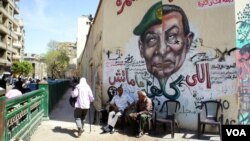LONDON —
As Egyptians mark the second anniversary of their revolution, experts are assessing the actual impact of the Arab Spring, which many people expected to transform the Middle East.
The Egyptian revolution was a time of great hope and enthusiasm among millions of Egyptians.
But the second anniversary finds secular liberals protesting what they see as excesses by the new Islamist-led government.
Multiple Arab Springs
The contrast is emblematic of the disappointment and conflict that followed the euphoria of the uprisings in Egypt, Libya, Tunisia and other countries.
“The word ‘revolution’ is a very romantic term,” said Stacy Gutkowski, a Middle East Expert at London’s King’s college.
“It conjures up images of something dramatic like the Berlin Wall falling. That isn’t what has happened in the region. These are rumblings, long-term rumblings. But not yet radical change.”
Gutkowski said people were bound to be disappointed, even where governments were overthrown. And the kind of dramatic change the North African countries have seen has not spread to other parts of the region, where activists face either lengthy violent conflict, as in Syria, or piecemeal changes meted out slowly by entrenched autocracies, as in the Persian Gulf states.
“To say that there is one Arab Spring is really a misnomer. In fact, there are three Arab Springs,” she said.
Work in progress
Considering the different types of governments and the variety of local cultures in the vast region, that’s not surprising. It certainly is not to the former British ambassador to Libya and Iran, Richard Dalton, who spoke to VOA via Skype.
“The Arab Awakening was always going to be the work of a generation. It’s not a surprise that there are different rates of change. But nowhere in the Arab World has the population been untouched,” said Dalton.
Not only is change slow and uneven, in some cases it is in the wrong direction - as people deal with issues the former autocrats covered up, like economic problems that have made life worse for many, rather than better. There also are concerns about the rights of women and members of minority groups.
And while the region’s new leaders are being tougher on the West and Israel, the autocrats’ pro-Western policies have not been changed as dramatically as many had hoped.
“Whatever government is in power, countries have interests and there’s a narrow range of options for maximizing advantage to both government and people,” said Dalton.
So, whether in the presidential palaces or in the streets, two years later the Arab Spring still is very much a work in progress.
The Egyptian revolution was a time of great hope and enthusiasm among millions of Egyptians.
But the second anniversary finds secular liberals protesting what they see as excesses by the new Islamist-led government.
Multiple Arab Springs
The contrast is emblematic of the disappointment and conflict that followed the euphoria of the uprisings in Egypt, Libya, Tunisia and other countries.
“The word ‘revolution’ is a very romantic term,” said Stacy Gutkowski, a Middle East Expert at London’s King’s college.
“It conjures up images of something dramatic like the Berlin Wall falling. That isn’t what has happened in the region. These are rumblings, long-term rumblings. But not yet radical change.”
Gutkowski said people were bound to be disappointed, even where governments were overthrown. And the kind of dramatic change the North African countries have seen has not spread to other parts of the region, where activists face either lengthy violent conflict, as in Syria, or piecemeal changes meted out slowly by entrenched autocracies, as in the Persian Gulf states.
“To say that there is one Arab Spring is really a misnomer. In fact, there are three Arab Springs,” she said.
Work in progress
Considering the different types of governments and the variety of local cultures in the vast region, that’s not surprising. It certainly is not to the former British ambassador to Libya and Iran, Richard Dalton, who spoke to VOA via Skype.
“The Arab Awakening was always going to be the work of a generation. It’s not a surprise that there are different rates of change. But nowhere in the Arab World has the population been untouched,” said Dalton.
Not only is change slow and uneven, in some cases it is in the wrong direction - as people deal with issues the former autocrats covered up, like economic problems that have made life worse for many, rather than better. There also are concerns about the rights of women and members of minority groups.
And while the region’s new leaders are being tougher on the West and Israel, the autocrats’ pro-Western policies have not been changed as dramatically as many had hoped.
“Whatever government is in power, countries have interests and there’s a narrow range of options for maximizing advantage to both government and people,” said Dalton.
So, whether in the presidential palaces or in the streets, two years later the Arab Spring still is very much a work in progress.











